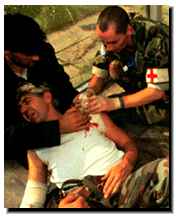For almost a year, Dr. Hasim Resic performed surgery in
an underground hospital. Actually, his surgical ward was a
maze of interconnected truck containers, eighteen-wheelers,
buried underground. Since they were underground, Resic and
his staff were able to work through mortar attacks, although
they could hear the shelling above them in East Mostar. The
electricity generally lasted only an hour or two. Resic often
resorted to meatball surgery which saved time, conserved supplies.
Once, he did a hernia operation in ten minutes, using only
a local anesthetic so he could save the general anesthetics
for more serious injuries. He treated too many young people
with bleeding ulcers, removed far too many limbs. This is
life for a surgeon in Bosnia.
 "You
can't believe what I've seen," he said in an interview during
a recent trip to the United States. "In Prijedor before the
war, I operated on every people--Bosnians, Serbs, Muslims,
Croats. I have been a doctor thirty-five years--saw everything--but
nothing like this. Many times I dream I am in Prijedor during
the massacres. Seven thousand young men killed. They are idiots.
Many of my friends were killed. Seven good doctors."
"You
can't believe what I've seen," he said in an interview during
a recent trip to the United States. "In Prijedor before the
war, I operated on every people--Bosnians, Serbs, Muslims,
Croats. I have been a doctor thirty-five years--saw everything--but
nothing like this. Many times I dream I am in Prijedor during
the massacres. Seven thousand young men killed. They are idiots.
Many of my friends were killed. Seven good doctors."
After the Serbs overran his hospital in Prijedor, Resic worked
twenty straight days with a gun literally held to his head.
"If you made a mistake, you were done," he said. He survived
largely because he had treated many Serbs before the war.
But he was never sure how long his grace period would last.
"I saved many of my friends' sons and daughters. But when
the war came, they said to my wife, 'Don't ask us for help.
The Serb soldiers will know and kill us.'"
Resic came to the U.S. last summer, accompanying a fourteen-year-old
boy named Aldin, who had a congenital abnormality of the blood
vessels in his left leg. Resic feared that without sophisticated
treatment, Aldin would lose his leg. Resic knew the boy's
best friend had lost both of his legs and now spends all his
time sitting in his basement. He couldn't let that happen
to Aldin, too. So, with funding from a New England-based,
children's relief group called Nobody's Children, Resic brought
Aldin to Massachusetts General Hospital, where he was treated
successfully.
Aldin was eight when the war started. His mother was killed
by a Croatian sniper in 1992. She was bringing water back
to the house. He lives in a one-room flat with his father,
his grandmother, one uncle, and two cousins whose parents
were killed by shelling. "Can you imagine that you are thirsty,"
says Resic, "that water is only twenty meters from your house
and boom, a little bullet hits you and it's all over?"